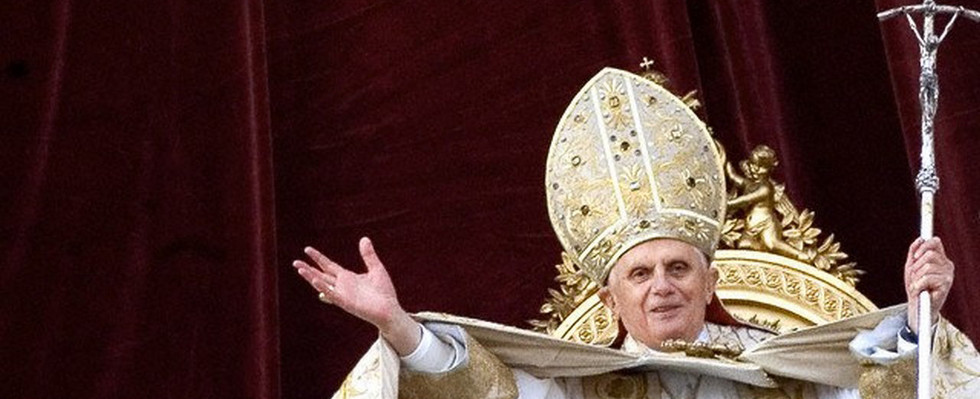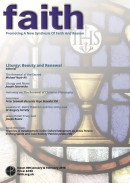Interview with Peter Seewald
Interview FAITH MAGAZINE January - February 2016
Peter Seewald “Without any doubt Benedict XVI is one of the most significant thinkers of the 20th century”
The editor of FAITH Joanna Bogle, with colleague Clare Anderson, interviews German writer Peter Seewald
Munich is a city of gleaming o ce-blocks and glorious baroque churches, tra c curling out towards the motorways and tourists crowding before the famous clock at the gothic town hall with its carved gures dancing as it chimes out the hour.
Journalist Peter Seewald became famous for his books written in collaboration with Joseph Ratzinger, later Benedict XVI: what began as one interview for a major German newspaper developed into a series of books over a number of years, exploring deep theological issues and the complex debates of our time.
He works in a book-lined study in a modern block looking out on to a courtyard garden, made us welcome with freshly-brewed co ee, and was happy to talk about the man he rst met back in the 1980s, and whose biography he is now writing.
We asked him first about the importance of Joseph Ratzinger/Benedict XVI as a thinker and a theologian.
Without any doubt he is one of the most signi cant thinkers of the 20th century - and as a theologian the greatest pope of all times. As a thinker he intrigued and inspired the world with his timely re ections and diagnosis about the change of society. And he proved to be right - though unfortunately his words weren’t adequately heeded.
His intellectual brilliance amplified his theological signi cance. He emerged at an early stage as a star theologian - aged just 35. He as a leading and defining mind of the Second Vatican Council. His Introduction to Christianity is a classic of Catholic teaching. I believe his Trilogy Jesus of Nazareth will be the basis for the faith of the Catholic Church in the 3rd millennium... He succeeded in clearing up the misrepresentations made about Jesus Christ even by theologians, and showed Him to us anew. He accomplished something considered virtually impossible: bringing together the historical Jesus and the Jesus of faith. To show Christ as an actual historic person on one hand and on the other hand as the Son of God, as He had announced Himself to be.
Joseph Ratzinger/Benedict XVI has no rival in successfully combining the reputed opposites of rationality and faith - thus showing science and religion not as contradictions but as two things depending on one another: only in cooperation can they reveal their true greatness.
What effect did his election as Pope in 2005 have on Germans at that time?
The response was very divided at first. On one side was great joy, on the other side was the scepticism that had to be expected. Remember that Germany is the land of the Reformation, the land of the division. Protestants are culturally dominant in Germany. For a long time Catholics were persecuted again and again... Because of all that, it wasn’t to be expected that everyone would be enthusiastic - and yet on his rst public appearance he caused a tidal wave of approval... there was that now famous headline in a yellow-press magazine: “We’re pope!”. It was perhaps a bit like a somewhat in ated national statement “We’re (soccer) world champion!”. Yet it expressed acceptance, the great joy that after ve hundred years a German had become pope.
He had worked for years in Rome at the Congregation of the Doctrine of the Faith so he was well known. How was he viewed in Germany?
There was this huge surprise: everyone took him for a man who couldn’t laugh, who was stern and strict and so on. Then suddenly, there’s this older, gentle, rather aesthetic man, who is approachable... everyone rubbed their eyes in wonder and said, how is it possible that a once strict Prefect of the Congregation for the Doctrine of the Faith, the “Panzer-Cardinal”, can unleash such enthusiasm?
I think this is for two reasons: For the rst time people could see him directly, without a lter, and secondly, with this new assignment the real charisma of Joseph Ratzinger could emerge.
He gathered crowds as never before in Rome at the General Audiences; his encyclicals were published by the million. Nobody had expected this. At World Youth Day in Cologne in 2005, even the sceptical media were excited, partly because of his friendly presence, partly because of his delicate courtesy and his thoughtful gestures, and especially because of the content of his statements.
Here was someone who didn’t want to turn himself into a cult object but instead he showed very clearly that he stands in the background - he stands for someone else. He stands for Jesus Christ.
Furthermore it became evident very soon that this was a kind of team ponti cate; Josef Ratzinger carried on with what John Paul II had started while putting new accents in place as well. He surprised people by removing the tiara from the coat of arms. Later on he emphasized the zero-tolerance policy for abusers...and much more.... One could see that John Paul II had stabilized the fortress Church and now, as his successor, Benedict XVI continued an internal renewal.
He took people in the Church forward by a gigantic, unprecedented catechesis. This convinced many people and as I said, it caused this wave of enthusiasm... On his travels he was greeted by millions of people, too...
He was sometimes called the “Panzer-Kardinal“. Do you recognize the man you know, when you hear that name?
This label did him great harm. I think it was invented by the British press because it was deduced so easily: German – Tank – Cardinal – General.
His position was certainly the most di cult the Catholic Church has to offer, namely as Protector of Faith, as Guardian of Faith. Others called him “Pope’s Policeman”. All rather negative adjectives – it’s not pleasant. It stained his image noticeably. On the other hand one should mention that he possessed a certain aloofness; he was distanced from things; from people as well as from the issues he was dealing with, and even a certain basic distance from his Church. This provided him with independence; it meant he could give authentic judgement in his verdicts.
He’s not your buddy-type; some people are, others aren’t. But at the same time he’s very easy to talk to. With none of my interview partners was it as easy to start a conversation as with him, and this is because of his great humility. He makes it easy for you, he accepts you a person.
There’s no barrier caused by struggle for power or by pride or vanity. Josef Ratzinger is the most straightforward man you can imagine. He approaches each and every person. Above all he listens extremely well, he accepts you and thus he can respond to you directly and easily. I’m thrilled by his tireless ght for human values. He exhausted himself with a lifelong commitment: people like that have to fascinate and a ect us.
Finally a rather personal question: you had come to know him very well. What was it like on the day he resigned as Pope?
I’ll never forget that moment... I received a phone call from a radio journalist and she said she had heard the pope had resigned. Surely it had to be a joke?. But it soon became evident that it wasn’t...
It was a day, as they say, that you never forget. For the very rst time in the history of the Catholic Church an actually reigning pope announced his retirement. But I must say, I was only surprised by the timing of the declaration - I wasn’t surprised that he wanted to do this one day.
We had met in April, in Castel Gandolfo, for a talk, including my biography. I had asked him then. He looked very tired at that time, as I noticed, he was even a bit depressed, completely exhausted and without strength.
I had the sense that he couldn’t go on, he was somehow at an end. It was because of his many, many exhausting travels: he had recently been to Cuba and Mexico. Yet I had also the impression that his life’s work had depleted him... he had no more energy to continue.
So I asked him: Holy Father, do you think about resignation? And he answered, yes, when physical and mental strength are no longer sufficient, than it’s not only a pope’s right but his duty to resign and make room for a new power.
I’d say this decision ts with him: it matches his whole reasoning... Ratzinger was always a very modern person, even if many didn’t see him this way; modern in a sense he does things no one has done before because they’re necessary, examining those steps like no one else. He examines them not only with his mind but of course in prayer as well. He concerned himself with this decision for many, many months and probably received an OK in answer to his prayers. Thus he catapulted the papacy into a new era. With this one action he lifted up the papacy in a way no one had considered possible. Many have criticized this step but he had said people will see that it was the right thing to do. And today we see that indeed it was right even if it is very painful for us, his devotees, that he’s not here any more... On the other hand, with his succession a new charisma has begun... We can see how Pope Francis continues many things which Benedict XVI has started...
Joanna Bogle and Clare Anderson are working on a television feature programme about Pope Benedict XVI for EWTN, which will be broadcast later this year.






